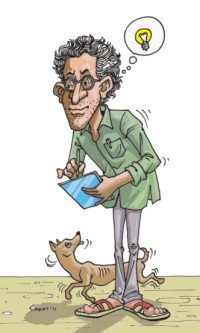| Home - Back Issues - The Team - Contact Us |
 |
| Volume 10 |Issue 15 | April 16, 2011 | |
|
|
Postscript How to know a Journalist AASHA MEHREEN AMIN
Speaking of stereotypes, there's more when it comes to appearances. Typical journalists, when starting out in an uncertain career, are quite defiant of fashion as they are of the establishment. Young journalists are supposed to be bold, irreverent and fearless with no qualms about going into the Secretariat or entering a plush international NGO office in their tattered jeans and fading T shirts or fotuas, not to mention the dust-attracting sandals. It's all about attitude which they have in plenty plus the nervousness they cause officials and big shots always on tenterhooks about how they will be presented in the next day's paper. For photojournalists of course, it doesn't matter what they wear, their heavy Canon 7Ds that they wield like AK 47s are a dead giveaway. The atypical journalist lives on bad canteen food. The years of consuming copious amounts of sickly-sweet, thickened tea with grease-dripping puris and stale shingaras interspersed with deep puffs of cigarette smoke have created stomachs of steel that can take just about any kind of toxin. Or so one would think. In reality, as they grow older the legacy of this diet comes in the form of life-long acidity, chronic indigestion, a heart condition, exhausted lungs (for the happy smokers) and perhaps a little hypertension and diabetes. These ailments often force them to become like other human beings who bring food from home in cute lunch boxes and who take morning walks to detox themselves. But what are journalists like as persons? Well as the stereotypes go, they are jaded, cynical and highly insensitive. They are however, also fun-loving creatures, something that can be witnessed from an impromptu visit to their place of work. The strongest strategies to survive the gruelling hours, absence of social life and bitterness regarding the affluence their friends in other professions enjoy, is to resort to making fun of practically everything –living or non-living- including themselves. Being constantly immersed in serious, often unpleasant realities, they prevent total loss of sanity (did we mention being slightly nutty is a prerequisite) by not taking life too seriously. The newsrooms, for instance, may resemble a honeycomb full of buzzing busy bees but in between the writing and editing of grisly or gloomy reports and heart wrenching features, there is plenty of banter and video games. Journalists, for your kind information, do not age. Journalists are also fiercely patriotic, passionate truth-seekers and have a natural allergy towards corruption (except those who stray of course; well, they are not real journalists anyway). They are also very curious by nature and tend to put their noses into everybody's business, much to the dismay of errant government officials, share market manipulators, naughty law enforcers and compulsive loan defaulters, to name a few. What about their love life? Male journalists try to form alliances with women who are understanding to the point of sainthood, self-sufficient and happy to be able to speak to their husbands once a week on their off-day. Women journalists try to find male journalists as their life-partners although this is the last thing their parents desire. Failing this they try to find financially stable males who are too busy to notice their long hours of absence or have also attained sainthood status. The general public believe journalists know everything and will even ask whether they know if Bangladesh will win a match in a future international cricket competition. In reality, journalists do know a little bit of everything. The rest they just google.
Copyright
(R) thedailystar.net 2011 |
